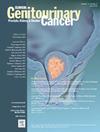Testing BRCA 1-2 Mutations in Metastatic Prostate Cancer: Results of a Survey of the Italian Association of Medical Oncology
IF 2.3
3区 医学
Q3 ONCOLOGY
引用次数: 0
Abstract
Background
20% of prostate cancer (PC) patients harbor germinal or somatic alterations in homologous recombination repair (HRR) genes, including BRCA1/2. BRCA mutations represent predictive biomarkers for treatment with polyadenosine diphosphate-ribose inhibitors (PARPi). Olaparib has shown efficacy in metastatic castration-resistant PC (mCRPC) and is currently approved in Italy for mCRPC with BRCA1/2 mutations. National and international guidelines strongly recommend BRCA testing in PC. However, genetic testing presents challenges in clinical practice that may limit access to PARPi.
Methods
we conducted a survey directed towards members of the Italian Association of Medical Oncology to highlight the level of implementation of national recommendations and issues associated with genetic testing. Through an anonymous questionnaire, the survey collected clinical data of PC patients undergoing BRCA testing and the main difficulties to face in conducting the analysis.
Results
The survey was completed by 108 participants (5% of AIOM members). 52.8% of respondents test BRCA in all metastatic PC patients. If tissue analysis is invalid, only 17% use liquid biopsy, and 15.7% always consider a re-biopsy of a metastatic lesion. A quarter of respondents have to outsource genetic testing to another center and 17.6% have a split process between different institutions. Long timelines, lack of a predefined procedure, and unavailability of liquid biopsy represent the main issues based on respondents' opinions.
Conclusions
BRCA testing in PC still presents several difficulties in clinical practice that can limit access to PARPi treatment. Better implementation of molecular testing to identify BRCA-mutated patients is crucial for tailored treatment in mCRPC.
在转移性前列腺癌中检测BRCA 1-2突变:意大利肿瘤医学协会调查结果
背景:20%的前列腺癌(PC)患者携带同源重组修复(HRR)基因的生发或体细胞改变,包括BRCA1/2。BRCA突变是使用聚腺苷二磷酸核糖抑制剂(PARPi)治疗的预测性生物标志物。奥拉帕尼已显示出对转移性去势耐药PC (mCRPC)的疗效,目前在意大利被批准用于BRCA1/2突变的mCRPC。国家和国际指南强烈建议在PC中进行BRCA检测。然而,基因检测在临床实践中提出了挑战,这可能会限制PARPi的获取。方法我们针对意大利肿瘤医学协会的成员进行了一项调查,以突出国家建议的实施水平以及与基因检测有关的问题。本调查通过匿名问卷的方式,收集了PC患者接受BRCA检测的临床资料以及进行分析时面临的主要困难。结果共有108人(占AIOM会员的5%)完成调查。52.8%的受访者在所有转移性PC患者中检测BRCA。如果组织分析无效,只有17%的人使用液体活检,15.7%的人总是考虑对转移灶进行再次活检。四分之一的受访者不得不将基因检测外包给其他中心,17.6%的受访者在不同的机构之间进行分离过程。根据受访者的意见,时间长,缺乏预定义的程序,以及无法获得液体活检是主要问题。结论PC的brca检测在临床实践中仍然存在一些困难,可能限制PARPi治疗的可及性。更好地实施分子检测以识别brca突变患者对于mCRPC的定制治疗至关重要。
本文章由计算机程序翻译,如有差异,请以英文原文为准。
求助全文
约1分钟内获得全文
求助全文
来源期刊

Clinical genitourinary cancer
医学-泌尿学与肾脏学
CiteScore
5.20
自引率
6.20%
发文量
201
审稿时长
54 days
期刊介绍:
Clinical Genitourinary Cancer is a peer-reviewed journal that publishes original articles describing various aspects of clinical and translational research in genitourinary cancers. Clinical Genitourinary Cancer is devoted to articles on detection, diagnosis, prevention, and treatment of genitourinary cancers. The main emphasis is on recent scientific developments in all areas related to genitourinary malignancies. Specific areas of interest include clinical research and mechanistic approaches; drug sensitivity and resistance; gene and antisense therapy; pathology, markers, and prognostic indicators; chemoprevention strategies; multimodality therapy; and integration of various approaches.
 求助内容:
求助内容: 应助结果提醒方式:
应助结果提醒方式:


